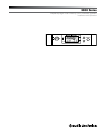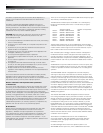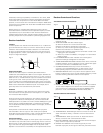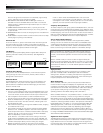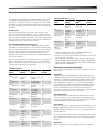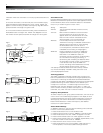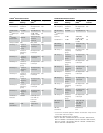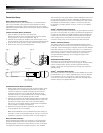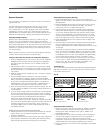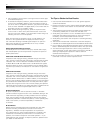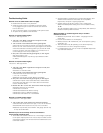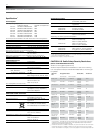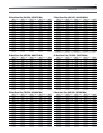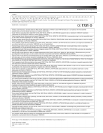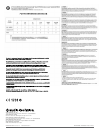
3000 Series Installation and Operation
11
Troubleshooting Guide
Receiver is not on (LCD window does not light).
• Receiver Power switch is not pressed in.
• Small DC power cord from included in-line power supply
is not plugged into jack on back of receiver. (Use the cord
hook to secure it.)
• The in-line power supply is not plugged into AC power outlet.
• AC power is not present at the AC outlet.
Receiver is on (LCD window lights).
- No sound - Alert light is OFF:
3 “RF”, “AF” and “BATT” legends do not appear in LCD.
• Receiver is in the Menu mode.
3 “RF” and “AF” level meters both show good signals.
• AF Level control on back of receiver not turned up (clockwise).
Note: If the “AF” level meter shows a good signal on the receiver
when the transmitter is receiving audio input, and the AF Level
control is turned up, then the problem is in connections to or
control settings on the mixer, amplier, etc.
3 Only “RF” level meter shows good signal; no “AF” signal.
• No sound input to mic.
• ATW-T310b body-pack only: Wrong input selected (“INST”
or “MIC”).
Receiver is on (LCD window lights).
- No sound - Alert light is ON:
3 “RF”, “AF” and “BATT” legends do not appear in LCD, and
LCD is ashing.
• Receiver is in the Edit mode.
3 “RF” and “AF” level meters both show good signals.
• The transmitter audio level is too high
(“+3”/”+6” on receiver).
• Batteries may be weak. (Check “BATT” fuel gauge.)
3 Only “RF” level meter shows good signal; no “AF”signal.
• Transmitter may be muted. (Note: Normally it takes several
seconds for the Alert light to turn off/on after the transmitter
mute is switched off/on.)
3 Neither the “RF” nor the “AF” level meter shows any signal.
• Receiver antennas not connected.
• Transmitter is turned off.
• Transmitter batteries are dead or missing.
• Transmitter is set to a different frequency.
• Transmitter and receiver not in same Band.
Receiver is on (LCD window lights).
- Distorted sound - Alert light is ON:
3 “RF” and/or “AF” level meters may show good signals.
• The transmitter audio level is too high (“+3”/”+6” on receiver).
• Received RF level may be too low (only one or two bars).
• Batteries may be weak; check “BATT” fuel gauge. (Sound may
or may not be distorted.)
Momentary loss of sound/noisy sound as transmitter is
moved around performing area.
• Transmitter and receiver antennas not in line-of-sight (or perhaps
too far apart). Adjust positions of units so they are visible to each
other/closer together; use remote antennas located closer to the
transmitter location.
• Signal blockage or interference from large metal objects, other
wireless units located too close and/or on incompatible
frequencies, computer or lighting equipment.
• Squelch setting may be set “tighter” than it needs to be.
(Recommended squelch setting is the minimum/default value,
15 dB.)
Tip: Use the Meter Hold function to help identify and resolve (or
at least avoid) RF problem locations.
With transmitter on, received signal is noisy or contains
extraneous sounds.
• Batteries may be weak. Check “BATT” fuel gauge and “RF”
meter level.
• Local TV transmissions on this frequency.
• Nearby sources of RF interference, such as computers, lighting
equipment, etc.
• Two transmitters may be operating on the same frequency.
Locate and turn one off or change its frequency.
• In multiple-system use, two (or more) incompatible frequencies
may have been selected.



